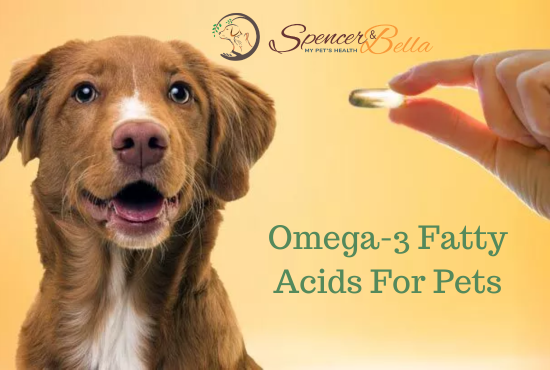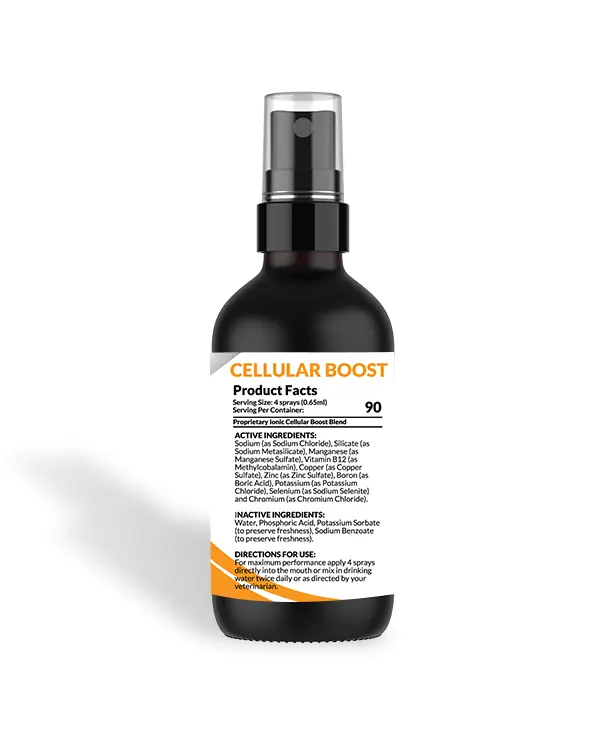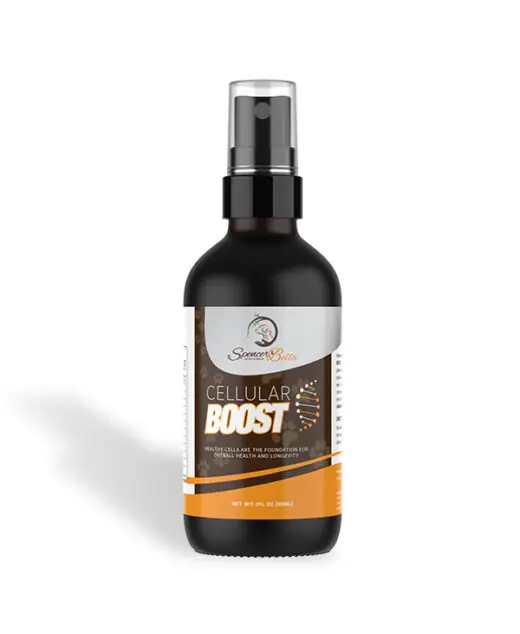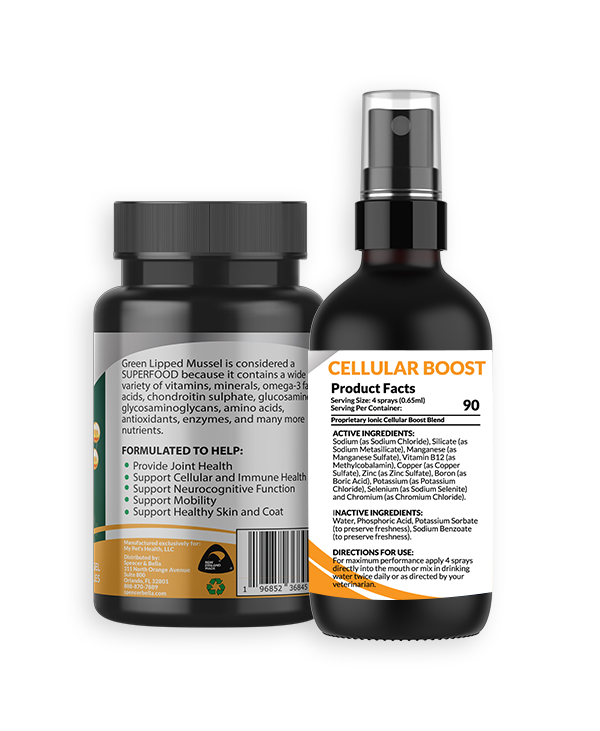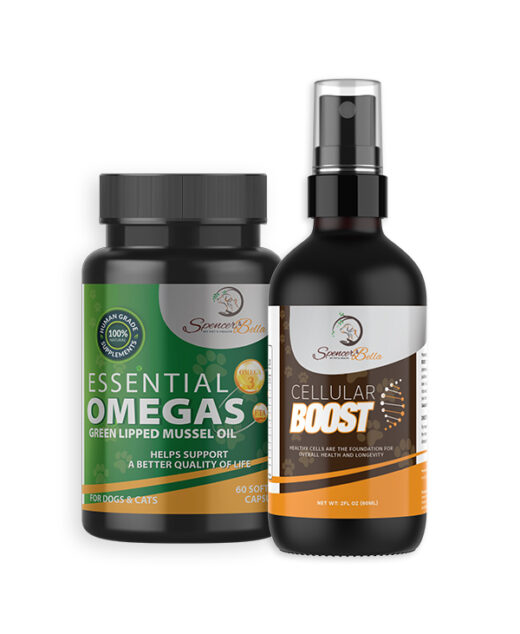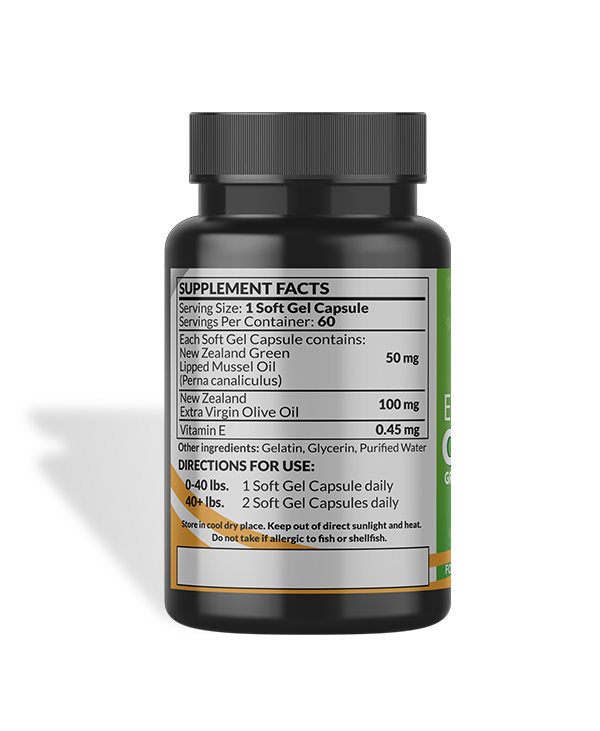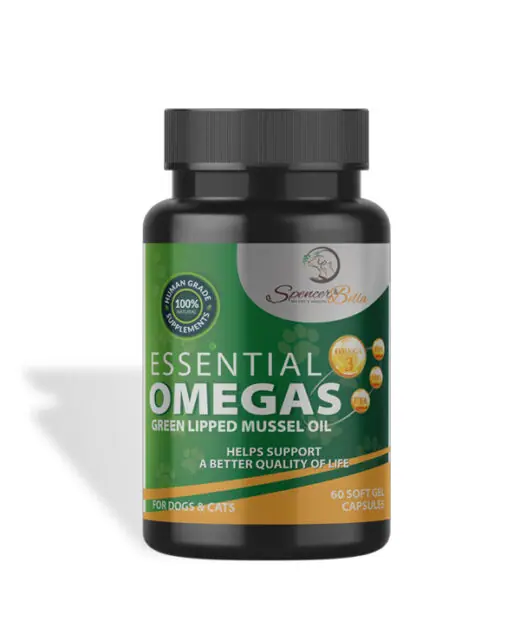Our beloved pets require Omega-3 fatty acids to maintain optimal health. These essential fats, including eicosapentaenoic acid (EPA) and docosahexaenoic acid (DHA), cannot be produced by their bodies, so they need to obtain them through their diet. These polyunsaturated fats are commonly present in marine sources like fish and algae, as well as in plant-based sources such as flaxseed and chia seeds.
Omega-3 fatty acids offer numerous benefits for pets, supporting various aspects of their overall well-being. EPA and DHA are known for their anti-inflammatory properties, which can help alleviate symptoms of allergies, arthritis, and other inflammatory conditions. They also promote healthy skin and coat, reducing dryness, itchiness, and excessive shedding. Additionally, omega-3 fatty acids contribute to joint health, supporting mobility and reducing the risk of joint disorders.
Beyond physical health, omega-3 fatty acids play a vital role in supporting cognitive function in pets. These essential fats are involved in brain development and can enhance learning, memory, and overall mental acuity. Furthermore, omega-3 fatty acids have been shown to support cardiovascular health by reducing the risk of heart disease, improving heart function, and maintaining healthy blood pressure levels.
Sources of Omega-3 Fatty Acids
Marine Sources:
Marine sources of omega-3 fatty acids are known to be rich in EPA and DHA. These sources include:
- Fish Oil: Oily fish such as salmon, mackerel, sardines, and anchovies are excellent sources of EPA and DHA. Fish oil supplements derived from these fish provide a concentrated dose of omega-3 fatty acids.
- Green-Lipped Mussel: Green-lipped mussel is a marine mollusk found in the waters of New Zealand. It is a natural source of omega-3 fatty acids, including EPA, DHA, and a unique omega-3 known as eicosatetraenoic acid (ETA). Green-lipped mussel oil derived from this shellfish provides a potent and bioavailable form of omega-3 fatty acids.
- Krill Oil: Krill is a small marine crustacean and a source of omega-3 fatty acids. Krill oil contains EPA and DHA in a form that is easily absorbed by the body. It is also a sustainable option, as krill populations are abundant in the ocean. However, it is essential to consider the potential impact of krill harvesting on the marine ecosystem.
Krill occupies a vital position in the marine food chain, being a primary food source for numerous marine creatures such as whales, seals, penguins, and fish. The commercial harvesting of krill for purposes such as krill oil supplements can have a detrimental effect on these marine species. Overfishing of krill can disrupt the delicate balance of the marine ecosystem and potentially lead to adverse consequences for higher-level predators that depend on krill for sustenance.
Plant-based sources of omega-3 fatty acids
These provide a vegetarian or vegan option for pets. These sources include:
- Flaxseed Oil: Flaxseed oil is derived from the seeds of the flax plant and is a rich source of alpha-linolenic acid (ALA), a precursor to EPA and DHA. However, it is important to note that dogs and cats have limited ability to convert ALA into EPA and DHA, so plant-based sources may not provide these specific omega-3 fatty acids in the most readily usable form for them.
- Chia Seeds: Chia seeds are another plant-based source of ALA. They can be ground and added to a pet’s food to provide a small amount of omega-3 fatty acids.
- Algal Oil: Algal oil is derived from microalgae and provides a direct source of EPA and DHA. It is an excellent option for pets following a vegetarian or vegan diet, as it is free from any animal-derived ingredients.
Our SUPERFOOD “Human Grade” High Potency All-Natural Supplement helps reduce inflammation in all parts of the body and supports all systems in the body including digestion, hip and joint, skin and coat, circulatory system, and immune system.
Read our blog about the benefits of Cellular BOOST daily for your cats and dogs.
-
Cellular BOOST
$35.00 - or Subscribe and Save 10% -
Cellular BOOST & Essential OMEGAS Bundle
$84.00 - or Subscribe and Save 10% -
Essential OMEGAS
$49.00 - or Subscribe and Save 10%
Why is Marine Omega- 3 better for your pet than plant-based Omega-3?
Marine sources of omega-3 fatty acids, such as fish oil, krill oil, and green-lipped mussel oil, are often considered superior to plant-based sources for several reasons:
Bioavailability:
Marine sources provide omega-3 fatty acids in the form of EPA and DHA, which are readily available for absorption and utilization by the pet’s body. Dogs and cats have limited ability to convert the plant-based omega-3 fatty acid ALA into EPA and DHA, so providing these specific forms directly through marine sources ensures optimal utilization.
Higher Concentration:
Marine sources typically contain higher concentrations of EPA and DHA compared to plant-based sources. This means that smaller amounts of marine-derived omega-3 supplements can provide the desired health benefits, making it easier to administer the appropriate dosage to pets.
Unique Fatty Acids:
Marine sources, particularly green-lipped mussel oil, offer additional unique fatty acids such as ETA (eicosatetraenoic acid). ETA has shown potential anti-inflammatory properties, which can be beneficial for pets with conditions like arthritis or joint inflammation.
Balanced Omega-3 to Omega-6 Ratio:
Plant-based sources of omega-3 fatty acids, such as flaxseed oil, tend to have a higher ratio of omega-3 to omega-6 fatty acids. While omega-3 fatty acids are beneficial, an imbalance in the omega-3 to omega-6 ratio can lead to inflammation. Marine sources, on the other hand, provide a more balanced ratio of omega-3 to omega-6, which is important for overall health.
Quality and Purity:
Marine omega-3 supplements, especially those from reputable manufacturers like Spencer and Bella, undergo stringent quality control processes to ensure purity and absence of contaminants. This is particularly important for fish oil supplements, as fish may accumulate environmental toxins such as mercury and PCBs. High-quality marine omega-3 supplements are often molecularly distilled or undergo other purification methods to remove any potential contaminants.
Green-lipped mussel oil offers an advantage in terms of quality and purity. Green-lipped mussels are sustainably farmed in the pristine waters of New Zealand, which are known for their low pollution levels. As a result, green-lipped mussel oil does not have the same quality concerns as other fish oils, making it a reliable and safe source of omega-3 fatty acids for pets.
While plant-based sources like flaxseed oil and chia seeds can provide some omega-3 fatty acids, they may not offer the same bioavailability, concentration, or balance of fatty acids as marine sources. However, if a pet follows a vegetarian or vegan diet, or has specific dietary restrictions, plant-based omega-3 options like algal oil can be a suitable alternative.
Consult with a veterinarian to determine the most appropriate source of omega-3 supplementation for your pet based on their specific health needs, dietary restrictions, and individual circumstances.
Key Differences Between Green-Lipped Mussel Oil and Fish Oil
1. Omega-3 Fatty Acid Composition and Ratio
The omega-3 fatty acid composition and ratio of green-lipped mussel oil and fish oil differ. Fish oil, renowned for its high content of eicosapentaenoic acid (EPA) and docosahexaenoic acid (DHA), which are long-chain omega-3 fatty acids, has undergone extensive research due to its association with various health benefits for pets. In contrast, green-lipped mussel oil not only contains EPA and DHA but also features another unique omega-3 fatty acid known as eicosatetraenoic acid (ETA). ETA, a beneficial fatty acid not commonly found in other marine sources or plant-based omega-3 supplements, makes green-lipped mussel oil stand out as a distinctive source.
Moreover, it is important to consider the conversion ratio when comparing the efficacy of green-lipped mussel oil to fish oil. Green-lipped mussel oil is highly concentrated in omega-3 fatty acids, which means that a smaller amount is needed to provide the desired health benefits for pets. In contrast, fish oil may require a larger quantity to achieve similar levels of EPA, DHA, and ETA. In fact, it would take a significantly higher amount of fish oil to match the potency and effectiveness of green-lipped mussel oil. This underscores the superior bioavailability and efficacy of green-lipped mussel oil in delivering essential omega-3 fatty acids to pets.
By highlighting the conversion ratio and the need for a larger amount of fish oil to match the efficacy of green-lipped mussel oil, it helps emphasize the substantial difference between the two and reinforces the idea that green-lipped mussel oil provides a more efficient and effective source of omega-3 supplementation for pets.
2. Bioavailability and Absorption
Another important distinction between green-lipped mussel oil and fish oil is their bioavailability and absorption. Bioavailability pertains to the degree of absorption and utilization of a nutrient by the body. Fish oil, especially when provided in triglyceride form, is well-absorbed by pets. However, the bioavailability of omega-3 fatty acids from green-lipped mussel oil may be even higher due to the unique structure and composition of the oil.
Green-lipped mussel oil contains lipids (fats) that are similar to the lipids found in pet cell membranes. This similarity may enhance the absorption and utilization of the omega-3 fatty acids from green-lipped mussel oil, allowing pets to reap the maximum benefits from supplementation. The higher bioavailability of green-lipped mussel oil may result in a more efficient delivery of omega-3 fatty acids to the pet’s body, supporting various physiological functions.
Research indicates that the body absorbs green-lipped mussel oil more rapidly than fish oil. The unique lipid profile of green-lipped mussel oil, including a high concentration of phospholipids, accounts for its faster absorption rate. Phospholipids, essential constituents of cell membranes, play a crucial role in cellular transport and uptake. Because of its lipid structure resembling cell membranes, pets’ cells readily integrate green-lipped mussel oil, leading to efficient absorption and utilization of its beneficial compounds.
Fish Oil
On the other hand, fish oil, particularly in its triglyceride form, may exhibit a slightly slower absorption rate. Its in comparison to green-lipped mussel oil. Although fish oil still provides omega-3 fatty acids and offers various health benefits. Its absorption may be influenced by factors such as the specific triglyceride profile. The presence of other dietary components, and individual variations in metabolism are also influenced.
The superior bioavailability and faster absorption rate of green-lipped mussel oil can be advantageous for pets. Because it ensures a higher proportion of the omega-3 fatty acids and has other beneficial compounds. These are effectively absorbed and utilized by the body. This means that pets may potentially experience faster and more pronounced benefits from consuming green-lipped mussel oil compared to fish oil.
It is important to note that individual variations in metabolism and the quality of the supplements can influence the bioavailability and absorption of omega-3 fatty acids. Additionally, the specific health needs of your pet should be taken into consideration when selecting the most suitable omega-3 supplement.
3. Additional Nutrients and Antioxidants Present
While both green-lipped mussel oil and fish oil provide omega-3 fatty acids, they also differ in the presence of additional nutrients and antioxidants. Fish oil contains naturally occurring vitamin E, which serves as an antioxidant, protecting the omega-3 fatty acids from oxidation. Some fish oil supplements may also be fortified with additional antioxidants, such as mixed tocopherols or rosemary extract, to further enhance their stability and shelf life.
Green-lipped mussel oil, on the other hand, contains a broader spectrum of nutrients and antioxidants, including chondroitin, glucosamine, and glucans. Chondroitin and glucosamine are compounds known for their joint-supporting properties. They play a crucial role in maintaining healthy cartilage and promoting joint flexibility and mobility.
In addition to chondroitin and glucosamine, green-lipped mussel oil also contains glucans, which are types of polysaccharides. Glucans have immunomodulatory properties and can support a healthy immune system response. They help to strengthen the body’s defense mechanisms and enhance overall immune function.
The presence of these additional nutrients and antioxidants in green-lipped mussel oil further contributes to its overall health benefits for pets. The combination of omega-3 fatty acids, chondroitin, glucosamine, and glucans provides a comprehensive approach to supporting joint health, promoting mobility, and enhancing the immune system.
Moreover, the natural presence of vitamins C and E, as well as minerals like zinc and selenium. In green-lipped mussel oil adds to its nutritional profile. These vitamins and minerals work synergistically with omega-3 fatty acids. Additionally, other components to support various physiological functions and overall well-being in pets.
4. Potential Allergenicity and Side Effects
Allergenicity and side effects are important considerations when selecting omega-3 supplements for pets. Fish oil, although highly beneficial, may pose a risk of allergic reactions in pets with known fish allergies. Additionally, pets may experience gastrointestinal upset, such as loose stools or diarrhea, when introduced to fish oil for the first time. These side effects are temporary and subside as the pet’s body adjusts to the supplementation.
Green-lipped mussel oil, on the other hand, is considered a hypoallergenic alternative to fish oil. It has a low allergenic potential, making it suitable for pets with known fish allergies or sensitivities. The unique composition of green-lipped mussel oil, including the absence of fish proteins, reduces the likelihood of triggering allergic reactions. However, it is important to note that individual sensitivities and allergies may vary. So it is advisable to introduce any new supplement gradually and monitor the pet’s response.
5. Tailoring to Specific Pet Health Needs
Both green-lipped mussel oil and fish oil offer significant advantages as they can be tailored to specific pet health needs. The omega-3 fatty acids found in both supplements provide numerous health benefits. It includes support for joint health, skin and coat health, cognitive function, cardiovascular health, and immune system function.
However, the unique fatty acid composition of green-lipped mussel oil, particularly the presence of ETA. It may provide additional benefits for certain health conditions. ETA has shown promising anti-inflammatory properties, making it particularly beneficial for pets with conditions such as arthritis or joint inflammation. The inclusion of green-lipped mussel oil in a pet’s omega-3 supplementation may offer targeted support for joint health and mobility.
Furthermore, the balance of EPA, DHA, and ETA in green-lipped mussel oil. Along with its additional nutrients and antioxidants, contributes to the overall well-being of pets. It provides a comprehensive blend of essential nutrients that support various body functions and helps maintain optimal health.
Final Thoughts
In conclusion, when it comes to choosing the best source of omega-3 fatty acids for our beloved pets, green-lipped mussel oil stands out. Its unique composition, including the presence of eicosatetraenoic acid (ETA) alongside EPA and DHA. These sets it apart from other marine and plant-based sources. Not only does green-lipped mussel oil offer a comprehensive blend of omega-3 fatty acids, but it also provides additional nutrients. Moreover, antioxidants, chondroitin, glucosamine, and glucanans that contribute to the overall well-being of pets.


